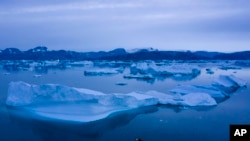A United Nations special report warns much of humanity is threatened by global warming's devastating impact on oceans and frozen regions of Earth.
The report by the Intergovernmental Panel on Climate Change concludes that climate change is accelerating ocean warming, rising sea levels, melting ice sheets and glaciers and causing other related environmental problems.
The report, released Wednesday, further warns if global warming does not slow down sea levels will rise by nearly a meter by the end of the century. Such an occurrence would result in fewer fish, less snow and ice and more powerful hurricanes and El Nino systems.
The report looks at the impact of human-driven climate change on glaciers, tundra, and on our oceans.
"It documents the ways in which the ocean has been acting as a sponge, absorbing carbon dioxide and heat to regulate the temperature. But it can’t keep up," said IPCC Vice-Chair Ko Barrett “Taken together, these changes show the world’s ocean and cryosphere have been taking the heat for climate change for decades. The consequences for nature and humanity are sweeping and severe.”
This is the third major IPCC report in a year on the impact of climate change. Its release comes after millions of people worldwide staged a climate strike last week, demanding urgent action, and after a U.N. climate summit in New York, which critics claim was more words than deeds.
Climatologist Hans-Otto Porter, one of the report’s authors, says some tipping points have already been crossed.
“Just think about the warm water and the coral reefs, which are already in decline and which are surpassing their tolerance threshold with every exposure to a heatwave,” he said.
But the bigger message is more hopeful: it’s still possible to turn things around. .
“There are many regions of the world, cities, countries, where action is being taken. It shows you can build development, improve the well-being of people, while reducing greenhouse gas emissions,” French climate scientist Valerie Masson-Delmotte said.
But the scientists say action must be swift and on a global level to be effective, and only if the global temperature rise stays well below 2 degrees Celsius.




